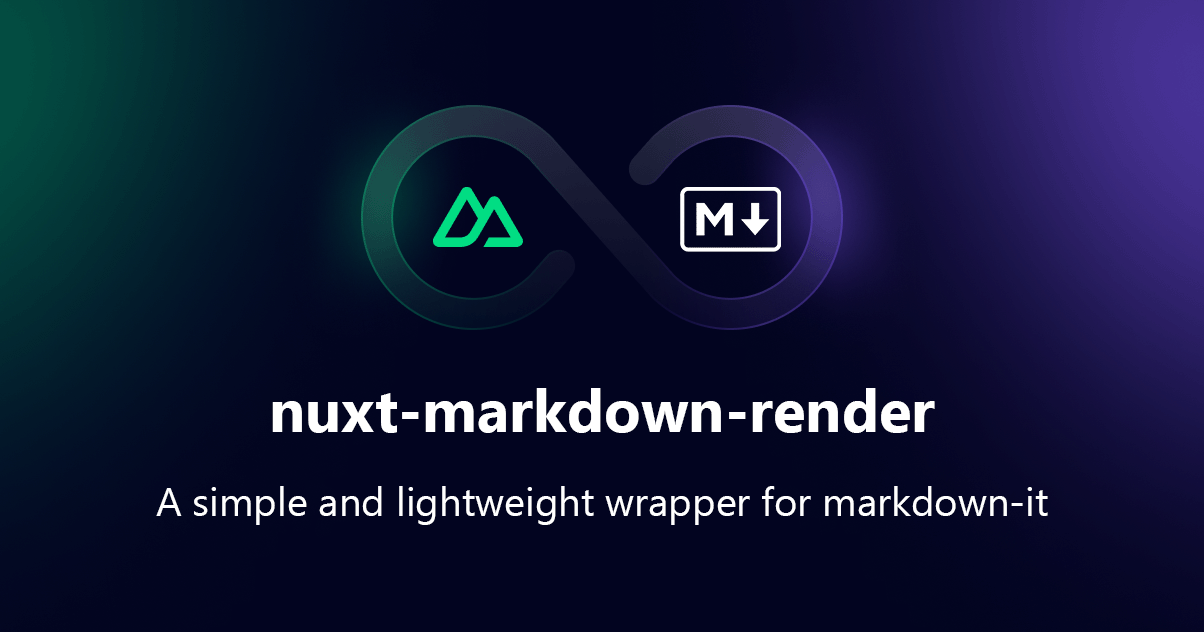nuxt-markdown-render v2.1.0

nuxt-markdown-render
Much inspired by vue-markdown-render, this Nuxt module is a simple and lightweight wrapper for markdown-it with full TypeScript support.
Features
- ✨ Ease of use
- 🔋 Battery included (mdc, shiki, anchor, link-attrbs, GitHub Alerts)
- 🧩 Extensible via
markdown-itplugins - 🎨 Customizable (both via
runtimeConfigas well as viaprops) - 📘 TypeScript support
How to use it
<template>
<div>
<NuxtMarkdown :source="md" :components="{ MyComponent }" />
</div>
</template>
<script setup>
import { MyComponent } from '#components'
const md = `
# Hello Nuxt!
Welcome to the example of [nuxt-markdown-render](https://github.com/sandros94/nuxt-markdown-render).
:MyComponent`
</script>checkout the MDC (Markdown Components) documentation on how to use components within markdown files.
Quick Setup
Add
nuxt-markdown-renderdependency to your project# Using pnpm pnpm add -D nuxt-markdown-render # Using yarn yarn add --dev nuxt-markdown-render # Using npm npm install --save-dev nuxt-markdown-renderAdd
nuxt-markdown-renderto themodulessection ofnuxt.config.tsexport default defineNuxtConfig({ modules: [ 'nuxt-markdown-render' ] })(OPTIONAL) Customize your defaults via
nuxtMarkdownRenderinside yournuxt.config.tsexport default defineNuxtConfig({ modules: [ 'nuxt-markdown-render' ], nuxtMarkdownRender: { as: 'article', // default 'div' component: 'NotNuxtMarkdown', // false to disable Nuxt's auto import options: { html: false // default true }, plugins: { mdc: false // default mdc options object anchor: { level: 2 // default 1 } } vueRuntimeCompiler: false // default true } })This will configure the following:
- render them as
articleHTML tags. - change the component name to
NotNuxtMarkdown. - disable HTML tags in source.
- disable the builit-in mdc plugin.
- disable vue's
runtimeCompiler.
- render them as
Using Plugins
There are two main ways to use markdown-it plugins, the first is made for simple plugins, passed as an array to the NuxtMarkdown component's props. The second is to create your own NuxtMarkdown component of advanced use cases.
Basic plugins
Simply import them and pass them as an array for the plugins prop.
<template>
<div>
<NuxtMarkdown :source="md" :plugins="[emoji]" />
</div>
</template>
<script setup>
import { full as emoji } from 'markdown-it-emoji'
const md = `my markdown content`
</script>Advanced Plugins
Some plugins, such asynchronous ones, do require to be handled directly by useNuxtMarkdown composable. This requires you to completelly overriding the NuxtMarkdown component with your own custom one.
start by disabling the builtin
NuxtMarkdowncomponent fromnuxt.config.ts:export default defineNuxtConfig({ modules: [ 'nuxt-markdown-render' ], nuxtMarkdownRender: { component: false, plugins: { shiki: false, }, }, })Create your own
~/components/NuxtMarkdown.vue, with the following structure (substitute plugins with the desired ones, since these come pre-installed):<template> <NuxtMarkdownRenderer :as="props.as" :components="{ Alert, Grid }" :source="content" /> </template> <script setup lang="ts"> // import installed plugins import shiki from '@shikijs/markdown-it' import otherPlugin from 'markdown-it-otherPlugin' // Import your other components import { Alert, Grid } from '#components' // if you are using the `markdown-it-mdc` plugin const props = defineProps< as?: string source?: string >() const { md, content } = useNuxtMarkdown(props.source, { plugins: [ await shiki({ themes: { light: 'vitesse-light', dark: 'vitesse-dark' } }), ], }) md.value.use(otherPlugin, { setting: 'my pick' }) // plugin with options </script>Use this new
NuxtMarkdowncomponent with all the plugins already configured.
That's it! You can now use nuxt-markdown-render module in your Nuxt app ✨
useNuxtMarkdown exports
The following are the available exports for useNuxtMarkdown composable.
const {
blank, // a computed boolean if a new markdown-it instance is being created
content, // rendered content from markdown-it
md, // the markdown-it instance
} = useNuxtMarkdown(source, configs)Development
# Install dependencies
pnpm install
# Generate type stubs
pnpm run dev:prepare
# Develop with the playground
pnpm run dev
# Build the playground
pnpm run dev:build
# Run ESLint
pnpm run lint
# Run Vitest
pnpm run test
pnpm run test:watch
# Release new version
pnpm run release2 years ago
2 years ago
2 years ago
2 years ago
2 years ago
2 years ago
2 years ago
2 years ago
2 years ago
2 years ago
2 years ago
2 years ago
2 years ago
2 years ago
2 years ago
2 years ago
2 years ago
2 years ago
2 years ago
2 years ago
2 years ago
2 years ago
2 years ago



